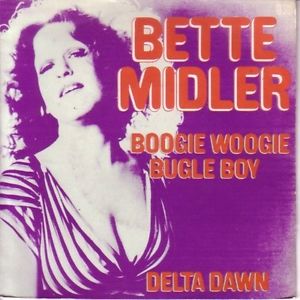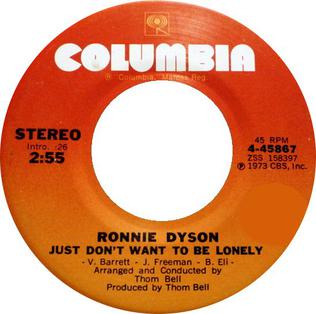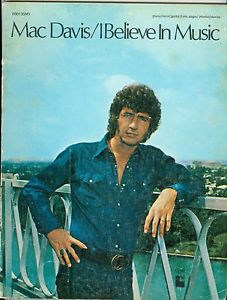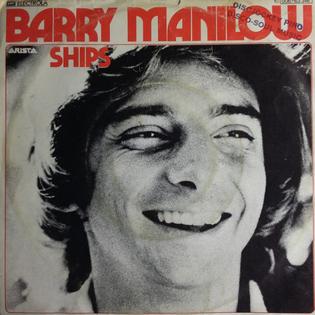
"Delta Dawn" is a song written by musician Larry Collins and country songwriter Alex Harvey. The first notable recording of the song was in 1971 by American singer and actress Bette Midler for her debut album The Divine Miss M. However it is best known as a 1972 top ten country hit for Tanya Tucker and a 1973 US number one hit for Helen Reddy.

"Breaking Up Is Hard to Do" is a song recorded by Neil Sedaka, co-written by Sedaka and Howard Greenfield. Sedaka recorded this song twice, in 1962 and 1975, in two significantly different arrangements, and it is considered to be his signature song. Between 1970 and 1975, it was a top-40 hit three separate times for three separate artists: Lenny Welch, The Partridge Family and Sedaka's second version. The song was also adapted into multiple languages, most notably in Italian and French.

"Break It to Me Gently" is a pop song written by blues musician Joe Seneca with lyrics by Diane Lampert. Both Brenda Lee and Juice Newton were met with considerable success with their versions of the song.

"Rhythm of the Rain" is a song performed by The Cascades, released in November 1962 in the US and on January 25, 1963 in the UK. It was written by Cascades band member John Claude Gummoe. On March 9, 1963, it rose to number 3 on the Billboard Hot 100, and spent two weeks at number 1 on Billboard's Easy Listening chart. Billboard ranked the record as the number 4 song of 1963.

"Goodbye Girl" is a song by David Gates, lead singer of Bread, which was released as a single in December 1977 following the premiere of the hit film of the same name. As the theme song to the film, the song reached number 15 on the Billboard Hot 100, becoming the biggest hit of Gates' solo career. It also reached number three on the Adult Contemporary chart. The song is from Gates' third solo album of the same name, released the following year.

"The Game of Love" is a 1964 song by Wayne Fontana and the Mindbenders, first released as a single from the band's titular album in January 1965 in the United Kingdom, followed by the United States one month later as "Game of Love". The song reached Number 2 on the UK Singles chart and Number 1 on the US Billboard Hot 100 that year. The song also spawned multiple successful cover versions, including a version by Ian "Tex Pistol" Morris that was a Number 1 hit in New Zealand in 1987. The song was also adapted into French by Frank Gérald as "Quand tu es là" and was recorded by French pop singer Sylvie Vartan, first in July 1965 as the second single off of her 1966 studio album "Il y a deux filles en moi" that was a hit in French-speaking Belgium, followed by a re-recording in 1990, released as a non-album single, that was a minor hit in France.

"The Way to Your Heart" is a 1988 hit single by Belgian band Soulsister from the album It Takes Two.

"Love on a Two-Way Street" is a soul ballad written by Sylvia Robinson and Bert Keyes in 1968. The song was originally recorded by Lezli Valentine, an artist signed to All Platinum, the record label that Sylvia Robinson co-owned with her husband, Joe. The song was then recorded by The Moments, an R&B vocal group signed to All Platinum subsidiary Stang Records, as filler for their 1968 album Not on the Outside, But on the Inside, Strong!. Sylvia and Joe decided to release the song as a single in March 1970 and it went on to become one of the biggest R&B hits of that year, spending five weeks at number one on Billboard's Soul Singles chart and reaching number three on the Hot 100 chart. Billboard ranked the record as the No. 25 song of 1970. It was also certified gold by the RIAA for sales of one million copies.

"Oh, Pretty Woman", or simply "Pretty Woman", is a song recorded by Roy Orbison and written by Orbison and Bill Dees. It was released as a single in August 1964 on Monument Records and spent three weeks at number one on the Billboard Hot 100 from September 26, 1964, making it the second and final single by Orbison to reach number one in the United States. It was also Orbison's third single to top the UK Singles Chart, where it spent three weeks at number one.

"My Melody of Love" is the title of a popular song from 1974 by the American singer Bobby Vinton. Vinton adapted his song from a German schlager song composed by Henry Mayer, and it appears on Vinton's album Melodies of Love. The song was also recorded by Spanish pop singer Karina as "Palabras de Cristal".

"One Hell of a Woman" is a 1974 song by the American singer-songwriter Mac Davis. The song was written by Davis and Mark James.
"Sad Movies (Make Me Cry)" is a 1961 pop song by the American singer Sue Thompson. The song was written by John D. Loudermilk and was released as Thompson's debut single, from her Hickory Records debut album Meet Sue Thompson. The song also spawned multiple successful cover versions.
"A Lover's Question" is a 1958 Pop, R&B hit for Clyde McPhatter. The single was written by Brook Benton and Jimmy T. Williams and was Clyde McPhatter's most successful Pop and R&B release. The bass singer is Noah Hopkins. "A Lover's Question" made it to #6 on the Billboard Hot 100 and was #1 for one week on the R&B chart.

"I Just Can't Help Believing" is a song written by Barry Mann and Cynthia Weil.

"Just Don't Want to Be Lonely" is a song written by Bobby Eli, John Freeman and Vinnie Barrett, originally recorded in 1973 by Ronnie Dyson and popularized internationally by The Main Ingredient. Dyson's version reached No. 60 in the US Pop chart, No. 30 Adult Contemporary, and No. 29 in the US R&B chart. Its flipside was "Point of No Return", a song written by Thom Bell & Linda Creed.

"Never Ending Song of Love" is a song written by Delaney Bramlett, and, according to some sources, by his wife Bonnie Bramlett. It was originally recorded with their band, Delaney & Bonnie & Friends, in 1971 on the album Motel Shot. Released as a single by Atco Records the same year, "Never Ending Song of Love" became Delaney & Bonnie's greatest hit on the pop charts, reaching a peak of No. 13 on the Billboard Hot 100 and No. 8 on Easy Listening. It reached No. 16 in Australia.

"I Believe in Music" is a 1970 song written and recorded by Mac Davis and later included on his second album I Believe in Music. Gallery covered it in 1972 as the second of three singles off their Nice to Be with You album and the follow-up release to their title track.

"Ships" is a song written and originally performed by British musician Ian Hunter. The song was first released on Hunter's fourth solo album, You're Never Alone with a Schizophrenic in March 1979, and later released as a single in August 1979. Hunter's release of the single never made the charts. The song is said to be about Ian's relationship with his father.

"Really Wanna Know You" is a 1981 song by Gary Wright that was a hit single in the U.S., reaching No. 16 on the Billboard Hot 100. It was taken from the album The Right Place. The song spent 17 weeks on the chart and became Wright's third biggest U.S. hit. It was his final charting single.

"Summerlove Sensation" is a song originally recorded by the Bay City Rollers. It was part of their 1974 album Rollin'. In the same year, it was also released as a single five months prior. The single peaked at no. 3 on the UK Singles Chart. It also spawned two successful cover versions in the late 1970s, first a French adaption performed by French pop singer Sylvie Vartan, and a cover by American singer Bobby Vinton that was a minor hit in the charts.


















